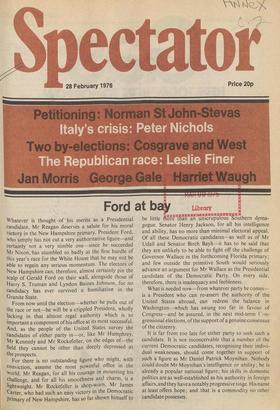Ford at bay Library xt
11
Whatever is thought of his merits as a Presidential candidate, Mr Reagan deserves a salute for his moral victory in the New Hampshire primary. President Ford, Who simply has not cut a very authoritative figure—and certainly not a very nimble one—since he succeeded Mr Nixon, has stumbled so badly at the first hurdle of this year's race for the White House that he may not be able to regain any serious momentum. The electors of New Hampshire can, therefore, almost certainly pin the scalp of Gerald Ford on their wall, alongside those of Harry S. Truman and Lyndon Baines Johnson, for no candidacy has ever survived a humiliation in the Granite State.
From now until the election—whether he pulls out of the race or not—he will be a crippled President, wholly lacking in that almost regal authority which is so Important a component of his office at its most successful. And, as the people of the United States survey the candidates of either party in—or, like Mr Humphrey, Mr Kennedy and Mr Rockefeller, on the edges of—the field they cannot be other than deeply depressed at the prospects. For there is no outstanding figure who might, with conviction, assume the most powerful office in the World. Mr Reagan, for all his courage in mounting his Challenge, and for all his smoothness and charm, is a lightweight. Mr Rockefeller is shop-worn. Mr James Carter, who had such an easy victory in the Democratic Primary of New Hampshire, has so far shown himself to be little Miore tnan an unscrupuious Southern demagogue. Senator Henry Jackson, for all his intelligence and ability, has no more than minimal electoral appeal. Of all these Democratic candidates—as well as of Mr Udall and Senator Birch Bayh—it has to be said that they are unlikely to be able to fight off the challenge of Governor Wallace in the forthcoming Florida primary; and few outside the primitive South would seriously advance an argument for Mr Wallace as the Presidential candidate of the Democratic Party. On every side, therefore, there is inadequacy and feebleness.
What is needed now—from whatever party he comes— is a President who can re-assert the authority of the United States abroad, can redress the balance in Washington—which has swung too far in favour of Congress—and be assured, in the next mid-term Congressional elections, of the support of a genuine consensus of the citizenry.
It is far from too late for either party to seek such a candidate. It is not inconceivable that a number of the current Democratic candidates, recognising their individual weaknesses, should come together in support of such a figure as Mr Daniel Patrick Moynihan. Nobody could doubt Mr Moynihan's intelligence Or ability; he is already a popular national figure; his skills in domestic politics are as well-established as his authority in foreign affairs, and they havea notably progressive tinge. His name at least offers hope; and that is a commodity no other candidate possesses.


































